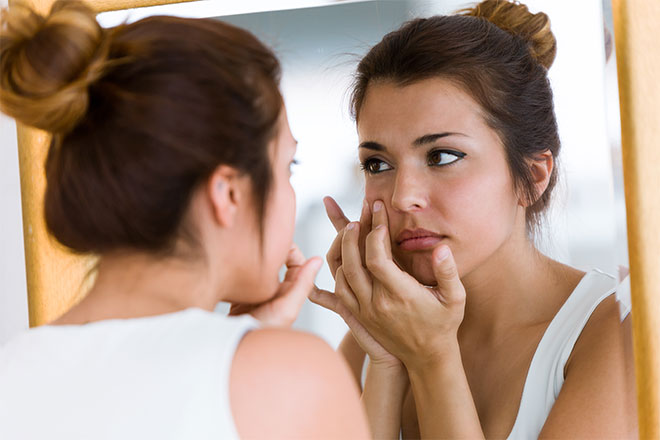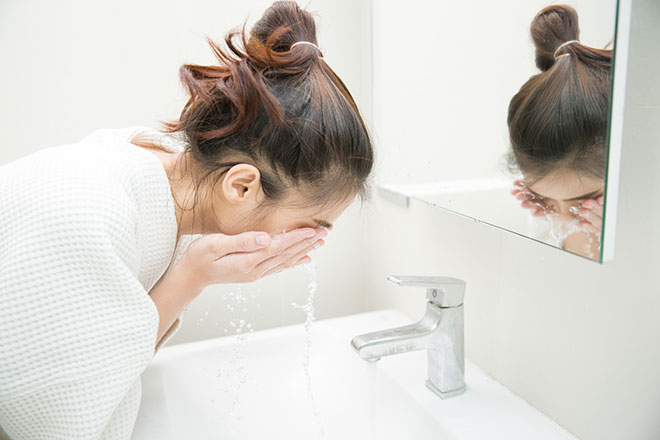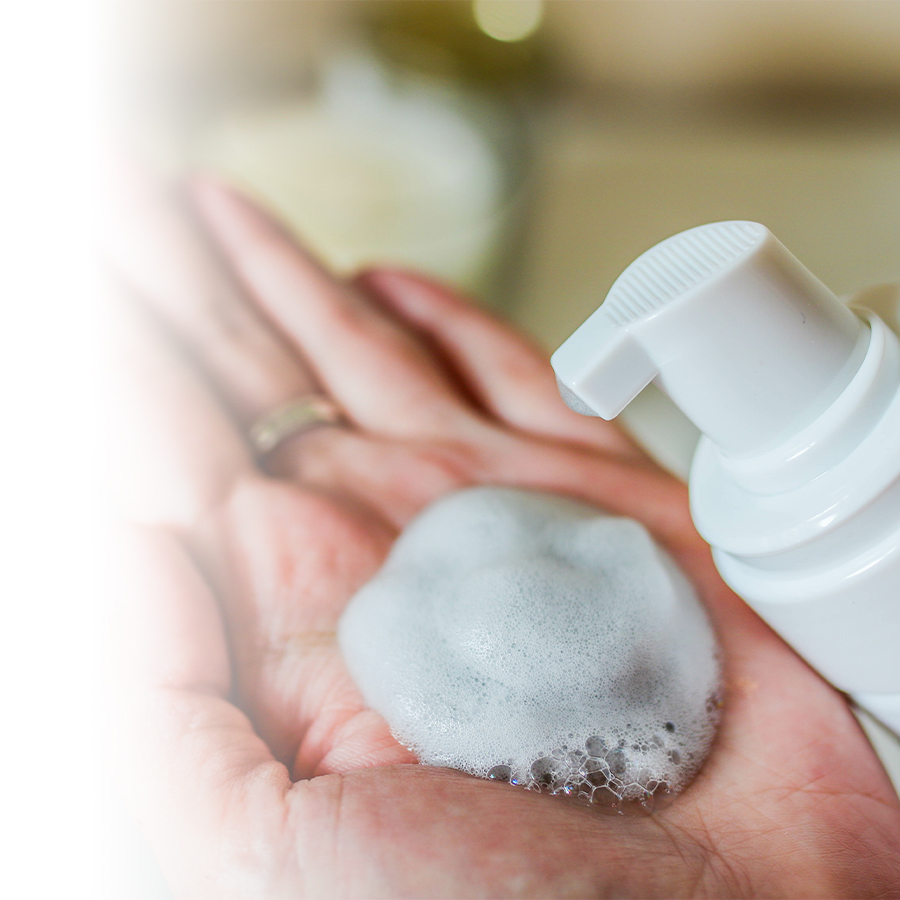Acne is an inflammation of the skin caused by an overproduction of sebum, which clogs pores and encourages bacterial proliferation. Contrary to popular belief, excessive hygiene often aggravates acne by destabilizing the skin barrier. Facial cleansing should therefore be gentle and regular: twice a day, with a soap-free, pH-neutral gel or foam.
Acne manifests as pimples, comedones (blackheads or whiteheads) and sometimes painful cysts. It mainly affects the face (facial acne), but also the back, chest and shoulders. Acne-prone skin can leave scars if not treated properly, which is why it is so important to treat it appropriately and take early action.
What causes acne?
- Sebum and hormones: During adolescence, androgen hormones stimulate the sebaceous glands. This is hormonal acne, common before menstruation or when there is a hormonal imbalance (the pill, polycystic ovary syndrome).
- Bacteria: Develop in clogged ducts, causing inflammation.
- Genetic factors: A family predisposition can make the skin more prone.
- Lifestyle: Stress, a diet rich in refined sugars or dairy products can aggravate flare-ups, without being the sole cause.
- Cosmetics: Comedogenic formulas clog pores; choose "non-comedogenic" and "oil-free" skincare products.
Did you know? 90% of young people suffer from acne and adults are not spared either. It may appear in infants for a short time (usually disappearing on its own). For adults, here are 6 solutions to get rid of acne.
How long does it take for acne treatments to take effect?
Several over-the-counter products are available to treat mild to moderate acne. It can take up to eight weeks to see any improvement, so you need to be patient and resist the temptation to pinch pimples to speed up their disappearance: this is the best way to keep the scars!
For severe or cystic acne, see a dermatologist, who may prescribe a more targeted treatment (antibiotics, retinoids).
What does baby acne look like?
Don't worry about your babies. Acne can appear between 2 and 4 weeks after birth, but this benign form usually disappears within 4 months. Simply cleanse with lukewarm water. Active creams should be avoided at this age.
Which areas of the body are most affected by acne?
Acne affects two main areas of the body, regardless of the age at which pimples appear.
Facial acne
The forehead-nose-chin axis, more commonly known as the "T-zone," which is richer in sebaceous glands. Blackheads?Get rid of them with our tips.
Acne on the back
Back acne is always harder to treat. It mainly covers the shoulders and upper back. Choose a gentle, non-comedogenic body gel. With the right treatment, it's possible to get rid of it, check out our article: How to get rid of back acne?
What is cystic acne?
Cystic acne forms deep, swollen and painful nodules. These lesions are more prone to scarring and often require medical treatment (corticosteroid injections, oral retinoids). In such cases, it is advisable to consult your doctor or a specialist such as a dermatologist.
Are you looking for a skincare routine to beat acne? Read our article and find out what you can do.
How to recognize and treat hormonal acne?
Hormonal acne is characterized by essentially inflammatory lesions (papules, pustules, sometimes nodules) that appear cyclically. They are localized on the lower face (chin, jaw) and often reappear in the same places from one cycle to the next.
How to get rid of acne?
Topical treatments, anti-androgenic contraceptive pills and short course antibiotics (local or oral) can be combined to unclog pores, balance hormones and reduce inflammation. Before taking any medication, we strongly recommend that you consult your doctor or dermatologist.
Tip: For severe or resistant forms, an androgen assay and gynaecological examination may point to appropriate treatment (polycystic ovary syndrome, for example).
How long before my period does acne appear?
Premenstrual acne flare-ups begin on average 7 to 10 days before the onset of menstruation. During this period, seborrhea increases and skin inflammation worsens.
How long does acne persist after I stop taking the pill?
When hormonal contraception is discontinued, there is often a “hormonal rebound” during which the skin gradually returns to its natural balance. This phenomenon generally lasts 3 to 6 months, the time it takes for androgen levels to stabilize. For some people, this phase can last up to 12 months, especially if the pill has been prescribed for several years.
Can I wear makeup when I have acne?Can I wear makeup when I have acne?
It is a good idea to let the skin breathe without makeup at least once a week. But on a day-to-day basis, makeup is an invaluable ally in camouflaging imperfections and redness, as long as you use the right products. Choose oil-free cosmetics, non-comedogenic emulsions and mineral powders.
Makeup tips for acne-prone skin
Acne is a source of stress when it comes to applying makeup. But nothing is impossible, you just need to adjust your beauty routine with the right steps and the right products for your skin.
- Use a mineral or water-based foundation.
- Apply mattifying powders to your skin to control excess sebum.
- Clean your brushes thoroughly every week.
Always remove makeup in the evening with a gentle milk or oil, then cleanse with a gentle foaming gel.
How can you tell acne from other skin conditions?
Here are the 3 main differences to help you differentiate between acne and other skin conditions:
- Rosacea: Diffuse redness and visible vessels, without blackheads.
- Seborrheic dermatitis: Oily patches, yellow scales (around nose, eyebrows).
- Miliaria: Small white papules associated with humidity or heat..

What can make acne pimples worse?
Several external factors can exacerbate acne flare-ups:
Repeated friction, such as that caused by a sports helmet or the tight straps of a backpack, which can irritate the skin and clog pores.
Heat and perspiration create a breeding ground for bacterial growth, which is why it's so important to choose light, breathable clothing.
Lifestyle habits such as regular alcohol consumption and smoking impair the skin's ability to regenerate and heal, which can prolong or aggravate inflammation.
Does the sun clear up acne?Does the sun clear up acne?
NO, IT DOES NOT. We tend to think that it does, because UV rays dry out lesions and tanning camouflages imperfections. But the healing effect is short-lived, and acne resurfaces (sometimes exponentially) after sunbathing.
Moreover, as acne treatment products can make the skin photosensitive, prolonged exposure to the sun is a bad idea. If you don't have a choice, apply a sun cream with an FPS of at least 30, and take care to choose a non-comedogenic formula to avoid clogging pores.
Are there any remedies for acne?
Yes, hydrocolloid patches can be effective. They absorb pus and protect the area. They are very useful for isolated pimples.
Are medications or creams effective against acne?
- Creams and gels: Benzoyl peroxide, salicylic acid, sulfur or fruit acids, depending on skin tolerance.
- Prescription drugs: Retinoids, antibiotics, oral or injectable, isotretinoin for severe acne.
Do not treat acne yourself. Each skin is unique, and suitable treatments recommended by specialists can be applied. Each case is unique. Start by asking your pharmacist for advice.

What is the worst food for acne?
There is no scientific evidence that junk food, alcohol, red meat or any other food causes acne. However, there is some evidence to suggest that a diet that is low in refined sugar or dairy-free may reduce acne flare-ups in people who already suffer from acne.
Acne affects a large proportion of the population, but effective solutions exist: from gentle cleansing to targeted treatments depending on the type of acne, including soothing skin care and good makeup habits. The key? Patience and regularity. For personalized follow-up, don't hesitate to consult a dermatologist or your pharmacist.

